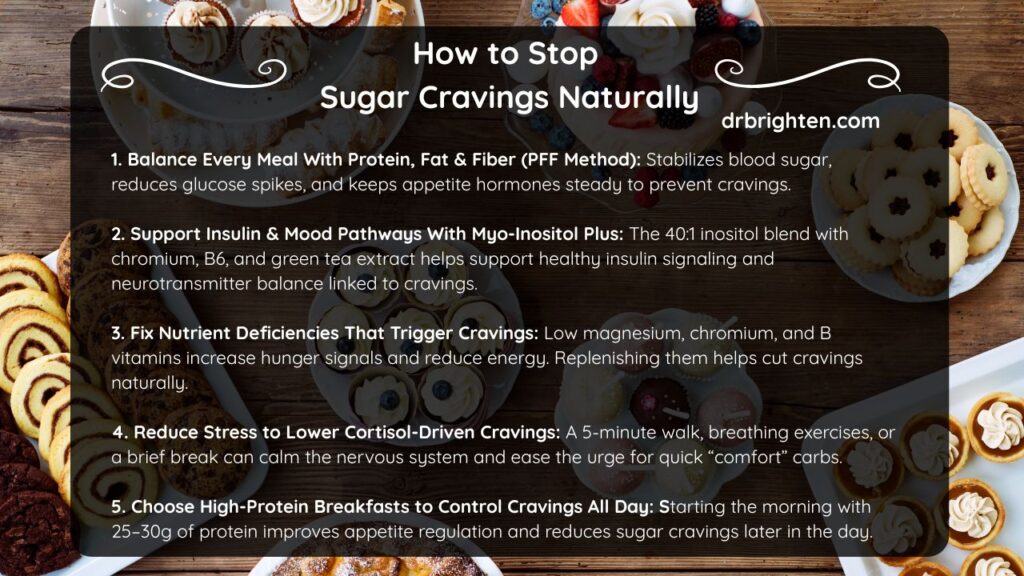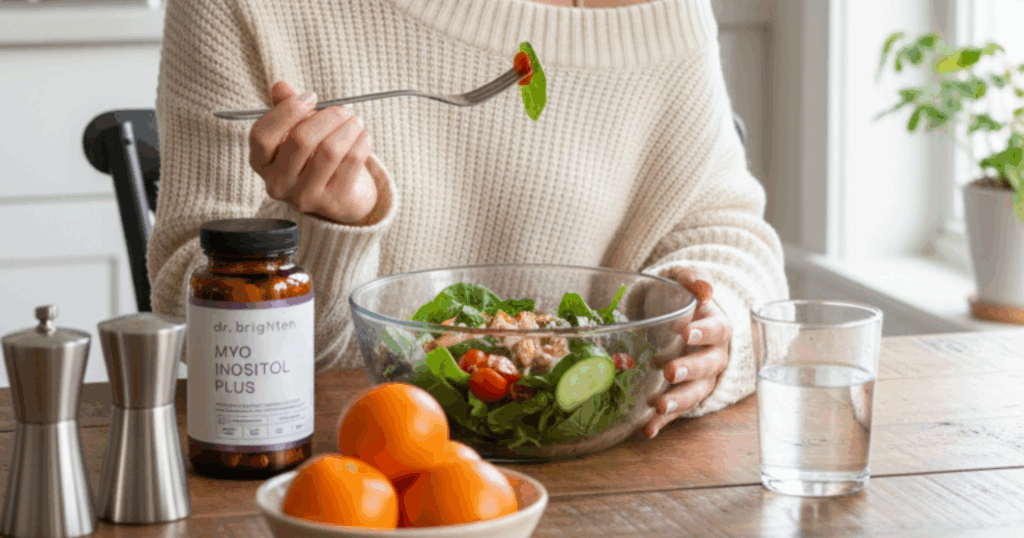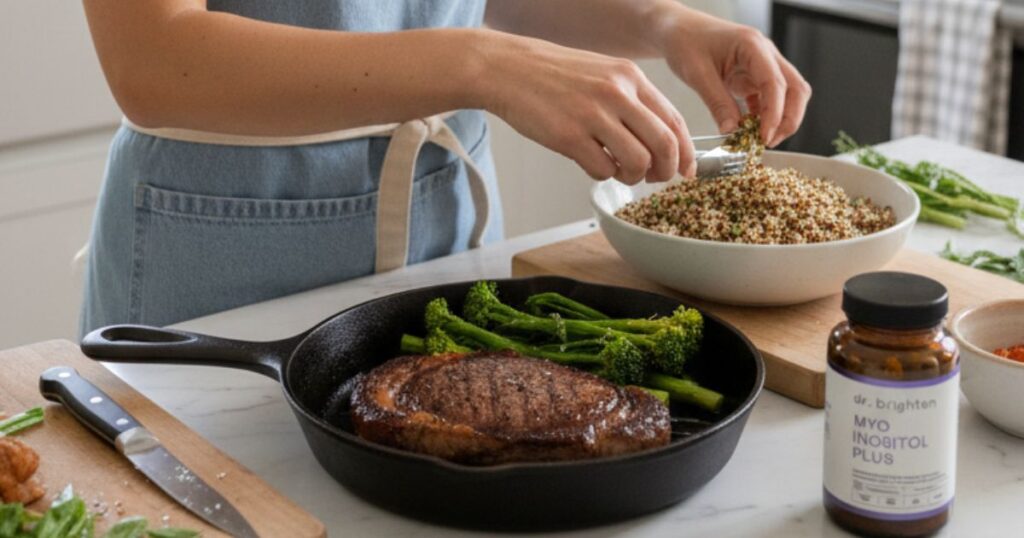Do you ever find yourself rummaging through the pantry for something sweet after dinner, or feel that irresistible pull toward chocolate, especially before your period? Sugar cravings can feel powerful, and for women, they’re often tied to hormonal shifts that affect their mood, metabolism, and even brain chemistry.
Managing a “sweet tooth” can be very tough to deal with, but you can help stop cravings for sugar naturally by addressing the underlying biological reasons for them—which can include stress, sleep deprivation, depression, or hormonal shifts—rather than relying on willpower alone.
Let’s unpack why sugar cravings happen (and are a common PMS symptom), what your body is really asking for, and how to use food, supplements, and herbs to finally stop craving sugar for good.
In this article:
- TLDR
- Why You Crave Sugar (And Why It's Not About Willpower)
- Quick Ways to Stop Sugar Cravings Fast
- Nutrient Deficiencies That Make You Crave Sugar
- How to Build a Plate That Stops Sugar Cravings (The PFF Method)
- What Stops Sugar Cravings Naturally
- How to Stop Craving Sugar After Meals
- A Step-by-Step Approach: How to Stop Craving Sugar Naturally
- What to Expect When You Reduce Sugar
- Key Takeaways on How to Stop Sugar Cravings
- Frequently Asked Questions About Sugar Cravings
TLDR
- If sugar cravings hit before your period, after meals, or during stress, your hormones—not your willpower—are driving them.
- You’ll learn why serotonin drops, dopamine dips, blood sugar spikes, and nutrient gaps (like magnesium and B6) make cravings feel urgent.
- This guide teaches simple, fast ways to interrupt cravings plus the PFF method to stabilize them long-term.
- Discover the key foods, vitamins, and herbs shown to curb cravings by supporting insulin, mood, and appetite signals.
- Myo Inositol Plus (40:1 inositol blend + chromium + B6 + green tea extract) is included as a supportive option for women with PMS, PCOS, or stress-related cravings.
Why You Crave Sugar (And Why It's Not About Willpower)
Sugar cravings aren’t a sign of weakness; they’re actually a signal, and in many cases, they’re your body’s way of communicating that something is out of balance.
Here are some of the common root causes for cravings, including for sugar and carbs (often refined ones, such as bread, pasta, desserts, and snacks):
1. Hormonal Fluctuations During the Luteal Phase/Before Your Period
Feel like you're always hungry on your period, or right before it? Studies show that about 85% of women1 experience at least some PMS symptoms, and that cravings for carbohydrates (which can include sugar) are one of the most common.
According to research by the American College of Obstetricians and Gynecologists2, up to 70% of women suffer from PMS-related food cravings. Why does this happen? If you find yourself craving sugar before your period, fluctuating hormones are likely mainly to blame.
During the luteal phase (the two weeks before menstruation), estrogen levels drop while progesterone rises. This can affect “feel-good” neurotransmitters like serotonin and dopamine, leading to changes in your appetite and mood.
When serotonin dips, your body instinctively seeks out foods that temporarily boost it, like sugar and refined carbs3. These quick hits of sweetness cause a brief rise in serotonin and dopamine, which explains that fleeting pleasurable sensation you get while and after eating something sugary.
2. Blood Sugar Imbalances
Another reason you might crave sugar on your period (or any time of the month) is unstable blood sugar, which is very common among women with PCOS.
When insulin levels spike and crash—usually from eating refined carbohydrates and not enough fiber, protein, and healthy fats—it sets off a vicious cycle of fatigue, irritability, and even more sugar cravings.
Hormonal changes also make your cells less responsive to insulin during the luteal phase. This is why balancing your blood sugar becomes even more crucial at that time of the month, since you're susceptible to cravings for any “quick fixes” that can potentially lift your spirits.
3. Nutrient Deficiencies
If you constantly find yourself wondering, “Why do I crave sugar all the time?”, your body might be missing key nutrients. For example, low levels of magnesium, chromium, and B vitamins can impair glucose metabolism and increase cravings for sweets.
Magnesium, for instance, supports over 300 enzymatic reactions, including those that regulate blood sugar. Chromium helps insulin transport glucose into cells for energy. And B vitamins, especially B6, are essential for a stable mood and energy production.
Without these, your body struggles to efficiently convert food into energy, which can prompt your brain to look for a quick fuel source (including sugar).
4. Lack of Protein and Healthy Fats
Another common reason women crave sugar all the time, especially in the afternoon or before their period, is simply not eating enough protein and healthy fats throughout the day.
Protein and fat work together to keep your blood sugar stable, support steady energy levels, and signal satiety hormones, like leptin and peptide YY, that tell your brain you’re full. When meals are mostly made up of refined carbs or quick snacks, blood sugar spikes and crashes become inevitable, and with every crash comes another round of cravings.
If you tend to crave sugar after meals, it’s often a sign that your plate was missing one of these key nutrients:
- Protein: Slows digestion, blunts blood sugar spikes, and provides amino acids like tryptophan and tyrosine, which your body uses to make neurotransmitters that sugar temporarily boosts.
- Healthy fats: Support hormone production (especially estrogen and progesterone), nourish your brain, and help you feel satisfied longer after eating.
Try including protein and fat along with fiber at every meal, such as eggs with avocado for breakfast, salmon with olive oil and greens for lunch, and grass-fed beef with roasted vegetables for dinner. This combination will reduce your dependence on quick carbs and naturally help stop cravings for sugar over time.
Even snacks can work in your favor: a handful of nuts, Greek yogurt with chia seeds, or celery with almond butter can all satisfy your body’s need for nourishment while preventing that mid-afternoon sugar crash.
Hormone Changes That Lead to Craving
| Hormone Shift | What Happens | Why You Crave Sugar |
| ↓ Estrogen | Lower serotonin | Seek carbs/sugar to lift mood |
| Progesterone fluctuations | ↓ Dopamine stability | Sugar gives temporary dopamine bump |
| ↑ Insulin resistance in luteal phase | Harder to stabilize glucose | More cravings |
Related:
Sugar and Brain Health: How Diet Shapes Kids’ Focus, Mood & Microbiome with Dr. Elisa Song
Quick Ways to Stop Sugar Cravings Fast
When a craving hits, you need simple, fast, physiology-based actions that stabilize blood sugar, calm the nervous system, and interrupt the dopamine-driven “reward” loop. These steps work quickly because they target the actual mechanisms behind cravings—not willpower.
Each strategy can be done in under two minutes (except the quick walk), and many people notice a rapid reduction in craving intensity.
1. Drink a Glass of Water
Mild dehydration can feel like cravings or hunger. Drinking 8–12 ounces of water helps reset interoceptive cues and often reduces the urge for something sweet.
2. Eat 10–15 Grams of Protein
A small dose of protein tells your brain that nourishment is coming, which stabilizes blood sugar and decreases the “urgent” feeling that drives sugar cravings.
Examples:
- a boiled egg
- a few bites of Greek yogurt or cottage cheese
- a small handful of nuts + a bite of protein
- 10g worth of a protein shake
For more protein snack ideas check out: Snacks With the Most Protein: What to Eat for a High-Protein Snack
3. Take Myo Inositol Plus
Myo-inositol supports insulin sensitivity, helps regulate post-meal glucose fluctuations, and plays a role in neurotransmitter signaling—including serotonin and dopamine, which influence cravings, mood, and appetite regulation.
This is why many people notice fewer cravings—especially during PMS, stress, PCOS-related cycles, or after high-carb meals—when taking myo-inositol consistently.
The clinically studied 40:1 ratio of myo-inositol to D-chiro in Myo Inositol Plus supports:
- steadier blood sugar
- improved insulin response
- calmer mood and reduced “need something sweet” impulses
- more stable appetite throughout the day
This is a research-backed way to cut the intensity of cravings naturally.
4. Take a 5-Minute Walk
A quick walk increases insulin sensitivity, reduces stress hormones, and boosts dopamine—often enough to extinguish cravings entirely by the time you’re back.
5. Sip Cinnamon Tea
Cinnamon can help slow digestion and reduce the post-meal glucose rise that leads to cravings. Cinnamon tea tastes naturally sweet without any sugar and acts as a “dessert replacement” that signals meal satisfaction to the brain.

Nutrient Deficiencies That Make You Crave Sugar
If you’ve ever wondered, “Why do I crave sugar all the time?”, one overlooked cause is nutrient deficiency. Your body uses specific minerals and vitamins to keep blood sugar stable, support neurotransmitters, and maintain steady energy. When these nutrients run low, your brain instinctively looks for the fastest fuel source it knows—sugar.
Magnesium Deficiency and Sugar Cravings
Magnesium plays a central role in insulin signaling, glucose metabolism, muscle relaxation, and the synthesis of serotonin and dopamine. Low magnesium levels can mimic both hunger and stress, setting you up for strong cravings—especially chocolate, which naturally contains small amounts of magnesium.
Common magnesium deficiency signs:
- chocolate cravings
- tight or cramping muscles
- PMS irritability and mood shifts
- difficulty sleeping or staying asleep
- headaches or increased tension
- feeling “wired but tired” at night
Because hormonal shifts in the luteal phase increase magnesium needs, deficiency-driven cravings often intensify before your period.
Chromium Deficiency and Blood Sugar Crashes
Chromium supports the ability of insulin to shuttle glucose into cells. Without enough chromium, you experience more dramatic blood sugar swings. Those spikes and crashes create a predictable cycle: you eat then blood sugar rises, followed by a rapid dip, and then cravings hit hard.
Common chromium deficiency signs:
- mid-afternoon energy crashes
- shakiness or feeling “hangry”
- rapid hunger return after meals
- irritability between meals
- increased cravings for sweets or refined carbs
Chromium is especially important for people with insulin resistance, PCOS, or reactive hypoglycemia.
B-Vitamin Deficiency and Constant Cravings
B vitamins—especially B6, B12, folate, and thiamine—are required for energy production, stress response, and neurotransmitter balance. If your body can’t efficiently convert food into fuel, you’re more likely to reach for quick-energy sugar sources.
This deficiency also mimics fatigue and brain fog, which many people misinterpret as hunger.
Common B-vitamin deficiency signs:
- low or inconsistent energy
- mood swings or irritability
- poor focus or difficulty concentrating
- heightened stress response
- increased appetite or emotional eating
- stronger cravings during PMS
Because B6 supports progesterone metabolism and serotonin balance, low levels can worsen premenstrual cravings.
How to Build a Plate That Stops Sugar Cravings (The PFF Method)
To make this simple and repeatable, use the PFF Method—a framework that helps stabilize blood sugar and keep cravings low by ensuring every meal contains:
- P = Protein
- F = Fat
- F = Fiber
This method is highly effective because it targets the physiologic drivers of cravings—glucose variability, insulin swings, low dopamine, and low satiety hormones.
If you want meal plans and recipes that help you implement this easily, grab the perimenopause weight loss plan for a holistic approach to curbing cravings.
Here’s how to put it into practice:
1. Protein (20–30 grams per meal)
Protein slows digestion, flattens glucose spikes, and keeps you full for hours. It also provides the amino acids (tryptophan, tyrosine) needed to make serotonin and dopamine—two neurotransmitters strongly linked to cravings.
Examples:
- eggs, Greek yogurt, cottage cheese
- salmon, chicken, beef, turkey
- lentils, beans, tofu, tempeh
2. Healthy Fats (1–2 tablespoons per meal)
Fats slow gastric emptying, support hormone production, and help keep blood sugar steady. Without enough fat, you often finish a meal feeling unsatisfied and find yourself hunting for something sweet.
Examples:
- avocado
- extra virgin olive oil
- nuts and seeds
- coconut, chia, flax
3. Fiber (at least 5–8 grams per meal)
Fiber reduces post-meal glucose spikes, feeds the gut microbiome, and increases satiety. Many women (especially those with ADHD, PCOS, or chronic stress) under-consume fiber, which leads to more cravings.
Examples:
- leafy greens
- broccoli, cauliflower, Brussels sprouts
- berries
- chia seeds, ground flax
Putting It All Together
PFF Meal Examples:
- Breakfast: eggs + sautéed kale + avocado
- Lunch: salmon + mixed greens + olive oil dressing + quinoa
- Dinner: grass-fed beef + roasted vegetables + side salad with nuts
- Snack: Greek yogurt + chia seeds OR apple + almond butter
This structure ensures your appetite stays regulated, your blood sugar stays stable, and your cravings are dramatically reduced—without relying on willpower.If you want done-for-you PFF meals and recipes, the Perimenopause Weight Loss Plan walks you through this method step-by-step.

What Stops Sugar Cravings Naturally
The most effective way to stop craving sugar is to nourish your body, not punish it.
When you address issues like lack of sleep and stress—and you build your meals around real, nutrient-dense foods rather than processed carbohydrates—your cravings quiet down and your hormones finally have what they need to function optimally.
Here’s how to target the root causes (like imbalanced hormones, blood sugar, HPA axis dysfunction, stress, and neurotransmitters) through diet, supplements, and supportive herbs.
1. Foods That Stop Sugar Cravings
Structuring your meals so that they stabilize your blood sugar is the foundation of reducing cravings. Focus on protein, fat, and fiber at every meal to slow glucose absorption and prevent crashes.
Best foods to stop sugar cravings:
- Protein-rich foods: Eggs, grass-fed beef, poultry, and lentils help keep you full longer and reduce appetite-stimulating hormones.
- Healthy fats: Avocado, nuts, olive oil, and coconut provide sustained energy and support hormone production.
- Fiber-rich vegetables: Leafy greens, cruciferous veggies, and flaxseed help regulate blood sugar and promote satiety.
- Fermented foods: Sauerkraut, kefir, and kimchi improve gut health, which plays a surprising role in reducing cravings.
Kick off the day right: Start your day with a breakfast that's good for hormones, specifically one with plenty of protein and fat instead of carbs. Research4 suggests that eating a high-protein breakfast can reduce appetite and cravings5 later in the day. One study6 even found that eating a breakfast with plenty of protein curbed cravings despite people feeling exhausted due to being sleep deprived.
2. Vitamins That Stop Sugar Cravings
Certain vitamins and minerals directly support your body’s ability to maintain stable energy levels and a balanced mood, making you far less likely to crave sugar.
Taking a well-formulated women’s multivitamin can help cover these bases, but you can also use targeted supplementation depending on your symptoms, such as a magnesium supplement or B complex.
- Magnesium: Known as the “relaxation mineral,” magnesium helps regulate insulin7 and glucose levels. Magnesium glycinate (the type found in Magnesium Plus) is especially helpful for women who experience PMS-related sugar cravings, plus it's gentle on the stomach and absorbed well.
- Chromium: Chromium is a trace mineral that can help improve insulin sensitivity8 and potentially reduce sugar cravings by helping glucose enter cells more efficiently. It's added to my Thyroid Support formula, along with other vitamins and minerals, including zinc and B2, to help maintain healthy cortisol, blood glucose, and insulin levels.
- B vitamins (B6, B12, folate): B vitamins are needed for energy metabolism and neurotransmitter balance. Low levels can make you feel fatigued or brain fogged and drive cravings for a quick sugar fix. One study9 found that a combination of vitamin B6, calcium, and zinc consistently had significant positive effects on the psychological symptoms of PMS, which can include cravings and poor food choices. Consider taking B Active Plus, which includes B6, B12, folate, and more.
- Zinc: Deficiency is linked to increased appetite and taste alterations that can heighten the desire for sweet foods.
3. Herbs That Can Help Stop Sugar Cravings
Several herbs have been shown to help stop sugar cravings by balancing blood sugar, improving insulin sensitivity, and supporting hormone health, such as by balancing cortisol levels (one of your main “stress hormones”).
You can use these herbs in supplement form or incorporate them into cooking (for example, cinnamon in your morning coffee or fenugreek in soups).
- Gymnema sylvestre: Known as the “sugar destroyer,10” this herb can actually reduce the ability to taste sweetness. This makes sugary foods less appealing, plus it can help with glycemic control and maintaining healthy blood glucose levels.
- Cinnamon: Helps slow carbohydrate absorption11 (by delaying gastric emptying). It can also improve insulin function, reducing post-meal sugar spikes, and it's a sugar-free way to make recipes and meals taste “sweeter” even without adding actual sugar.
- Fenugreek: Shown in studies12 to help lower blood sugar and reduce appetite by slowing digestion and carbohydrate metabolism. It's also generally anti-inflammatory and helpful for digestion.
- Berberine: Supports insulin sensitivity and activates AMPK13, a metabolic pathway that helps regulate blood sugar and fat metabolism.
- Adaptogens (Like Ashwagandha): If you tend to crave sugar when stressed, ashwagandha (found in Adrenal Calm and Adrenal Support) and other adaptogens like L-theanine may help get your sweet tooth and tendency to “emotionally eat” under control.
- Holy Basil: Holy basil is another adaptogenic herb used for hormonal balance, blood sugar support, anxiety, cholesterol, and inflammation. It's been shown to help improve blood sugar14 and cholesterol, including in those with metabolic disease.
- Myo-Inositol: One of my favorite science-backed solutions for balancing blood sugar and curbing cravings is myo-inositol—a nutrient similar to B vitamins that supports insulin sensitivity15, neurotransmitter function, and hormone balance. Many women notice fewer cravings, steadier energy, and improved mood within weeks of daily use.
If you often crave sugar before your period or feel tired and moody after meals, myo-inositol can help your cells respond better to insulin16—and in the process, reduce blood sugar spikes and crashes that trigger cravings. It also supports the balance of serotonin and dopamine, the two brain chemicals that influence mood and appetite.
This dual action makes it particularly helpful for women who experience PMS or PCOS-related sugar cravings, mood swings, or fatigue.
Consider trying Myo Inositol Plus, which is designed for hormone and mood support. Myo Inositol Plus combines two forms—myo-inositol and D-chiro-inositol—in the clinically researched 40:1 ratio, along with key nutrients like magnesium, B vitamins, and chromium to help stabilize blood sugar, support calmness17, and even encourage regular cycles and balanced hormones (especially in women with PCOS or PMS)
(Always consult your healthcare provider before starting new supplements, especially if you’re on medication or have a health condition.)
Supplement Comparison Table
| Supplement | How It Helps Cravings | Best For |
| Magnesium glycinate | stabilizes insulin, supports serotonin | PMS cravings |
| Myo-inositol (40:1 blend) | stabilizes insulin + neurotransmitter support | PCOS, PMS |
| Chromium | improves glucose transport | reactive hypoglycemia |
| Ashwagandha | reduces cortisol-driven cravings | stress eaters |

How to Stop Craving Sugar After Meals
If you finish lunch and immediately crave dessert, there's a good chance it's due to unbalanced macronutrients.
Try these quick adjustments:
- Add more protein and fat to every meal: This keeps blood sugar steady for hours. Think chicken with avocado or salmon with olive oil dressing.
- Avoid liquid calories: Juices and sodas spike blood sugar quickly and can contribute to crashes and cravings later on.
- Don’t skip breakfast: Skipping meals can lead to low blood sugar and an afternoon sugar binge. Instead, try a breakfast with 30 grams of protein to manage hunger right from the start.
- Slow down and focus on the meal: Avoid rushing or eating while distracted (such as working or scrolling on your phone), which can essentially cause you to “miss the meal,” feel less satisfied, and potentially overeat.
- End meals with tea: Peppermint or cinnamon tea can satisfy your taste buds and signal “meal complete” to your brain.
If cravings still hit, consider whether your body is tired, thirsty, or stressed. Cortisol fluctuations can also make you crave sugar18 all the time, so stress management is an important piece of the puzzle.
Related:
How to Fix a Hormone Imbalance – 5 Hormones & Foods to Support Them
Ozempic for Weight Loss: Side Effects, Benefits, Risks
A Step-by-Step Approach: How to Stop Craving Sugar Naturally
Let’s bring it all together. Here’s how to take control of your cravings holistically:
- Eat protein-rich meals (20–30 grams per meal and about 100 grams/day)
- Limit refined carbs and focus on complex ones, like sweet potatoes, lentils, or quinoa
- Include fiber and fat with all meals and snacks to slow glucose absorption
- Get enough sleep (7–9 hours) to keep cortisol balanced
- Manage stress with exercise, meditation, breathwork, journaling, or walks outdoors
- Use targeted supplements like Myo Inositol Plus, B Active Plus, Magnesium Plus, Adrenal Calm, and Thyroid Support to support healthy insulin and serotonin levels
- Eat plenty of leafy greens, pumpkin seeds, and whole eggs for a natural nutrient boost
- Include probiotic-rich foods and consider spore-based probiotics for deeper gut support
Related:
Snacks With the Most Protein: What to Eat for a High-Protein Snack
How to Sleep Better by Fixing Blood Sugar and Sleep Disruptors
Supplements for Menopause Belly Fat
What to Expect When You Reduce Sugar
When you start fighting back against your cravings and reducing sugar and refined carbs, it’s normal to feel more cravings at first since your body is recalibrating. Within a week or two, though, your taste buds adjust, and whole foods begin to taste sweeter naturally.
As you cut out sugar and your blood sugar stabilizes, you’ll likely notice:
- More consistent energy
- More manageable appetite
- Fewer mood swings
- Less bloating and inflammation
- Clearer skin
- Improved sleep quality
- Better focus
Over time, you’ll start craving stability and nourishment more than sugar, and that’s when you know your body’s truly in balance.
Related: Holiday Weight Gain Myths Debunked: What Really Happens and How to Stay Healthy
Key Takeaways on How to Stop Sugar Cravings
If you’ve been asking yourself, “How do I stop sugar cravings?”, start by listening to what your body and hormones are trying to tell you. Sugar cravings are often symptoms of underlying imbalances in blood sugar, neurotransmitters, or nutrient status, not a lack of willpower.
Focus on eating whole foods, taking supportive vitamins that stop sugar cravings, balancing hormones naturally, and using proven supplements like Myo Inositol Plus to keep your body nourished.
Frequently Asked Questions About Sugar Cravings
You can stop sugar cravings naturally by stabilizing your blood sugar with protein, fiber, and healthy fats; improving sleep; reducing stress; and correcting nutrient deficiencies. Supporting insulin sensitivity and neurotransmitter production—through diet, lifestyle, and targeted supplements—also helps reduce craving intensity.
During the luteal phase, estrogen decreases and progesterone fluctuates, which lowers serotonin and dopamine. This shift can cause mood changes, lower motivation, and an increased desire for quick sources of energy like sugar. Increased insulin resistance in the week before your period also contributes to stronger cravings.
Low levels of magnesium, chromium, B vitamins (especially B6), and zinc are commonly associated with increased cravings. These nutrients help regulate insulin, stabilize mood, and support energy metabolism—so deficiencies can lead to more frequent cravings.
Several research-backed supplements may help reduce cravings by supporting blood sugar balance, insulin sensitivity, mood regulation, and metabolic health. These include:
– Myo-inositol
– Chromium
– Magnesium glycinate
– B vitamins
– Cinnamon, fenugreek, berberine
Talk with a healthcare provider before starting new supplements, especially if you take medication.
Some women find it helpful to use a formula that combines several nutrients known to support insulin sensitivity, mood balance, and stable energy. Myo Inositol Plus includes:
– Myo-inositol and D-chiro in a clinically studied 40:1 ratio to support insulin signaling, metabolic function, and neurotransmitter balance
– Chromium, which helps glucose enter cells more efficiently and may reduce blood sugar swings
– Vitamin B6, which supports serotonin and dopamine pathways involved in cravings and PMS symptoms
– Green tea extract, which provides antioxidants and gentle metabolic support
This type of combination may benefit women who experience cravings related to PMS, PCOS, blood sugar variability, or stress-related eating patterns.
Protein, healthy fats, and fiber-rich foods are the most effective at stabilizing blood sugar and shutting down cravings quickly. Examples include eggs, nuts, avocado, salmon, Greek yogurt, beans, leafy greens, chia seeds, and cinnamon.
Craving sugar after meals usually indicates that the meal was low in protein, healthy fats, or fiber. Without these nutrients, blood sugar rises quickly and then drops, triggering a desire for something sweet. Eating too fast, skipping meals earlier in the day, or high stress can intensify these cravings.
Constant cravings may stem from blood sugar instability, high stress, lack of sleep, nutrient deficiencies, gut microbiome imbalances, or hormonal conditions such as PMS, PCOS, perimenopause, or thyroid issues. Dopamine dysregulation (common in ADHD) can also increase cravings for quick-reward foods like sugar.
They can be. If your cells struggle to absorb glucose efficiently, blood sugar swings become more common, leading to fatigue, hunger, and cravings—especially for sweets. Other signs of insulin resistance include weight gain around the midsection, difficulty concentrating, and afternoon crashes.
Yes. As your body recalibrates, cravings can temporarily intensify for a few days. This usually improves within a week as blood sugar stabilizes, taste receptors adjust, and appetite-regulating hormones normalize.
References
- https://pmc.ncbi.nlm.nih.gov/articles/PMC10316899/ ↩︎
- https://www.webmd.com/diet/features/is-pms-sabotaging-your-diet ↩︎
- https://pmc.ncbi.nlm.nih.gov/articles/PMC11206370/ ↩︎
- https://www.health.harvard.edu/staying-healthy/extra-protein-at-breakfast-helps-control-hunger ↩︎
- https://pmc.ncbi.nlm.nih.gov/articles/PMC3718776/ ↩︎
- https://www.sciencedirect.com/science/article/abs/pii/S0031938420305837 ↩︎
- https://pubmed.ncbi.nlm.nih.gov/35666386/ ↩︎
- https://pubmed.ncbi.nlm.nih.gov/21216583/ ↩︎
- https://academic.oup.com/nutritionreviews/article/83/2/280/7659847 ↩︎
- https://pmc.ncbi.nlm.nih.gov/articles/PMC3912882/ ↩︎
- https://pmc.ncbi.nlm.nih.gov/articles/PMC3180260/ ↩︎
- https://pmc.ncbi.nlm.nih.gov/articles/PMC10054907/ ↩︎
- https://pmc.ncbi.nlm.nih.gov/articles/PMC4504840/ ↩︎
- https://www.sciencedirect.com/science/article/abs/pii/S1756464618301166 ↩︎
- https://pubmed.ncbi.nlm.nih.gov/29980312/ ↩︎
- https://pubmed.ncbi.nlm.nih.gov/27602537/ ↩︎
- https://pmc.ncbi.nlm.nih.gov/articles/PMC6798087/ ↩︎
- https://pmc.ncbi.nlm.nih.gov/articles/PMC12257121/ ↩︎



